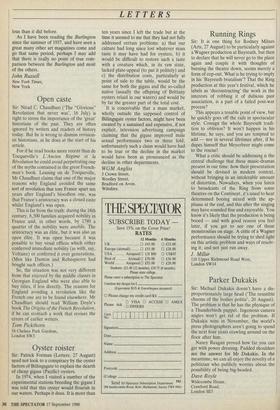Open caste
Sir: Nirad C. Chaudhuri (`The "Glorious" Revolution that never was', 16 July) is right to stress the importance of the 'great' historians of the past. They are often ignored by writers and readers of history today. But he is wrong to dismiss revision- ist historians, as he does at the start of his article.
For if he read books more recent than de Tocqueville's L'Ancien Regime et la Revolution he could avoid perpetrating one of the myths contained in the great French- man's book. Leaning on de Tocqueville, Mr Chaudhuri claims that one of the major reasons why England avoided the same sort of revolution that tore France apart ten years after England's bloodless one, was that France's aristocracy was a closed caste whilst England's was open.
This is far from the truth: during the 18th century, 6,500 families acquired nobility in France and, in other words, by 1789 a quarter of the nobility were anoblis. The aristocracy was an elite, but it was also an open elite. It was open because it was possible to buy venal offices which either conferred immediate nobility (as with, say, Voltaire) or conferred it over generations. (Men like Danton and Robespierre had bought such offices.) So, the situation was not very different from that enjoyed by the middle classes in Georgian England who were also able to buy titles, if less directly. The reasons for England avoiding a revolution like the French one are to be found elsewhere. Mr Chaudhuri should read William Doyle's book The Origins of the French Revolution, if he can stomach a work that revises the errors of earlier writers.
Tom Pickthorn
54 Chelsea Park Gardens, London SW3


































































 Previous page
Previous page